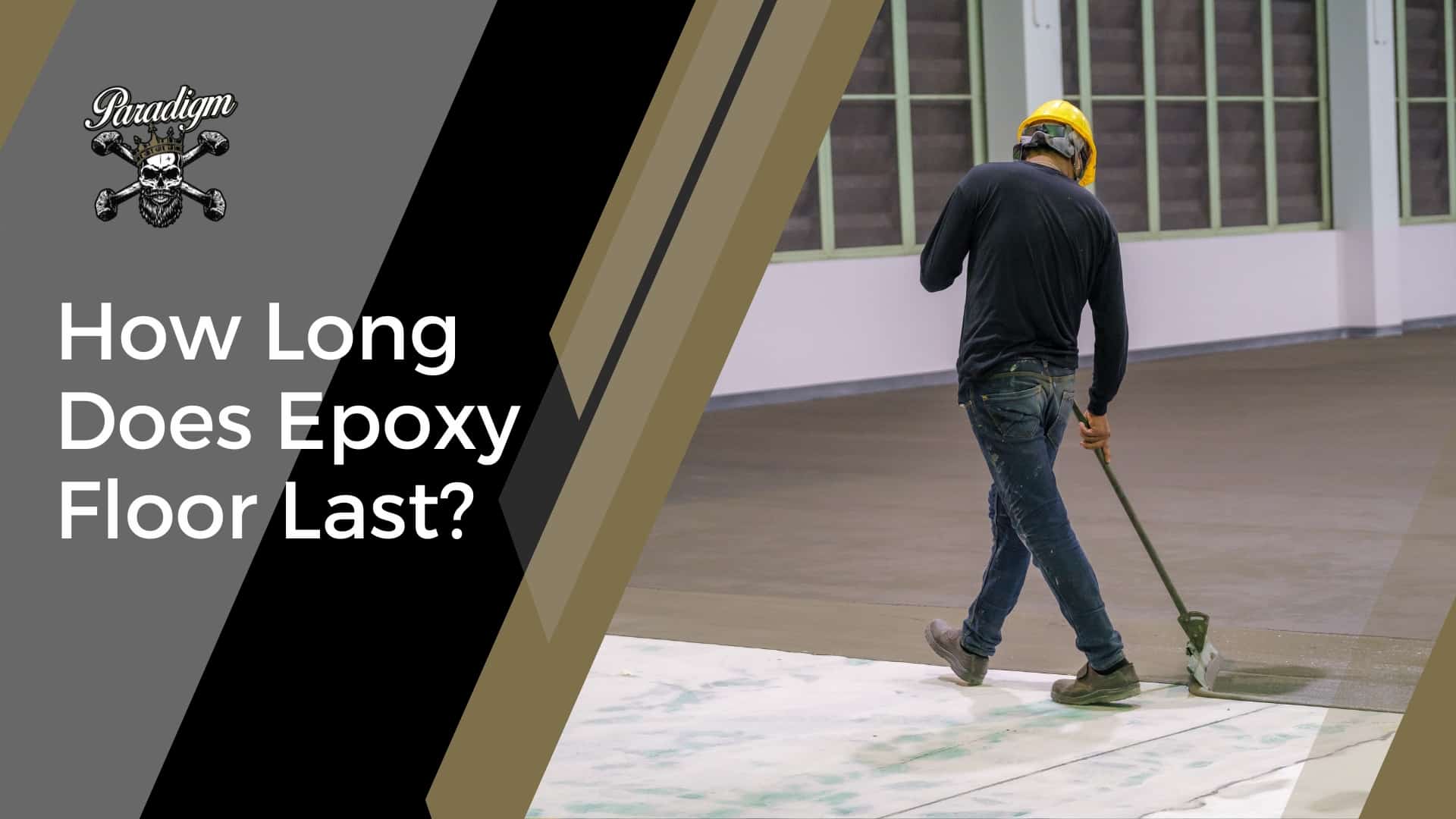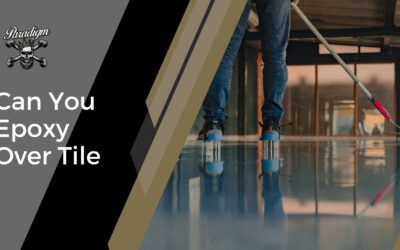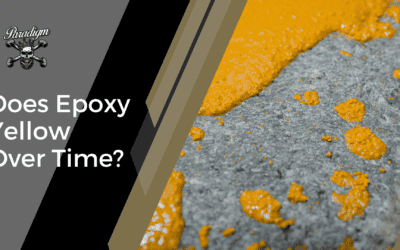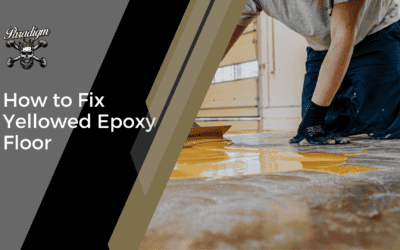Epoxy flooring is now a common sight in most industrial and residential spaces because of its durability, versatile nature, and aesthetic appeal. Due to its recent popularity, it is normal to ask the question, how long do epoxy floors last?
Epoxy floors last 10 to 20 years if properly installed. They are made from resin and a hardener, which bond to make a hard plastic. The lifespan of your epoxy floor also depends on factors like the floor surface type, installation quality, and levels of foot traffic.
The beauty and benefits of epoxy flooring have made it the rave of the building community. So, it is important to understand what influences the lifespan of epoxy flooring in order to make a better-informed decision.
Table of Contents
What Is The Lifespan For Epoxy Floors?
A well-installed and maintained epoxy floor can last 5-20 years or longer. The lifespan of epoxy floors varies greatly depending on many factors, such as environmental conditions, usage level, maintenance, and material quality.
In commercial and industrial settings with heavy traffic and harsh conditions, the lifespan of epoxy floors is reduced, and the need for repairs is more frequent compared to residential environments.
The quality of the materials used for epoxy flooring primarily determines its longevity. High-quality epoxy resins are made to withstand heavy traffic, chemical exposure, abrasion, and other stress factors.
Environmental factors like moisture level, temperature, UV radiation, and chemical exposure affect the lifespan of epoxy floors. Extreme conditions increase the risk of wear and tear on the epoxy. The installation process also involves the lifespan, as poor installation means a lesser lifespan.
What Are The Factors Affecting Epoxy Floor Lifespan?
Although epoxy flooring has a long lifespan on its own, several factors affect whether this life will extend or be short.
Below are some factors that affect the lifespan of epoxy floors:
- Quality of material: The durability of an epoxy floor depends on the quality of the epoxy resin and hardener. High-quality epoxy products are better and can withstand heavy traffic, chemical exposure, and abrasion. Lower-quality materials will form a less hard floor and increase the rate of wear and deterioration.
- Installation: Proper installation increases the lifespan of epoxy floors. Surface preparation, curing time, humidity, and temperature affect the epoxy material’s bonding strength. Poor bonding strength means poor epoxy flooring and a short lifespan.
- Environmental conditions: Exposure to harsh temperatures, UV radiation, and harsh chemicals increases the rate of wear of epoxy flooring, thus reducing its lifespan.
- Rate of usage: epoxy flooring with low traffic or usage will have a longer life than one with a high frequency of usage or traffic. The movements on the floor create abrasion that, in turn, wears the epoxy down with time.
- Under flooring: The flooring under the epoxy also determines how strong the epoxy flooring will be. A strong underfloor will increase the epoxy’s strength and longevity. However, if the underflooring is weak, then the epoxy flooring will be weak, too.
- Maintenance: Regular cleaning and proper maintenance will extend the lifespan of epoxy floors. Properly repairing any damages ensures that their integrity is not compromised.
What Are The Signs Of Epoxy Floor Degradation?
Some of the signs you’ll notice when the epoxy floor is degrading include cracks, chips, peeling, and even discolorations. Surface wear and tear increases the risk of compromising the integrity or strength of the epoxy floor and also affects its beauty and appearance.
You can also tell when epoxy floors start degrading when you notice reduced slip resistance, difficulty cleaning, and increased porosity. These issues are safety hazards that show underlying damage to the flooring surface.
The great thing about epoxy flooring is that it is easy to repair. You do not need to tear apart the old flooring. You can quickly fix the damage with the existing flooring intact.
How Can You Extend Epoxy Floor Lifespan?
In order to help your epoxy flooring last longer, there are some maintenance tips you have to follow. Here are how you can extend epoxy floor lifespan;
- Proper maintenance practices: proper regular cleaning practices include using non-abrasive cleaners and soft brooms or mops to get rid of dirt, debris, and spills. Do not use harsh chemicals or hard-tooth tools. They can damage your epoxy floor.
- Routine inspection: Always conduct regular inspections for signs of chipping, wear and tear, and cracks. Catching these damages will prevent them from spreading and causing more extensive damage.
- Reapplication: If the wear or damage is extensive, consider recoating or reapplying epoxy to the floor. Reapplication will restore your epoxy floor’s appearance and extend its lifespan.
How long an epoxy floor lasts depends heavily on your ability to maintain it well. While epoxy floors are known for their durability, like every other floor, they can deteriorate when not correctly and adequately cared for.
How Long Does An Epoxy Floor Typically Last?
An epoxy floor lasts 5 to 20 years with proper maintenance. However, this lifespan depends on several factors. Factors that affect the longevity of an epoxy floor include the quality of materials, level of usage, installation, and environmental conditions like humidity, sun exposure, chemicals, and temperature.
Does The Type Of Epoxy Used Affect The Lifespan Of The Floor?
Yes, the type of epoxy used affects the lifespan of the floor. High-quality epoxy material will withstand heavy traffic and other exposures better than low-grade materials.
Can Epoxy Floors Be Repaired Or Recoated To Extend Their Lifespan?
Yes, epoxy floors can be repaired to increase their longevity. Repairing minor issues like cracks, surface wear, and chips rejuvenates the floor and improves its appearance and durability.
How Do Environmental Conditions Affect The Longevity Of Epoxy Floors?
Environmental conditions like moisture levels, exposure to sunlight, harsh chemicals, and temperature fluctuations increase the risk of faster wear and deterioration.
What Maintenance Practices Can Help Extend The Lifespan Of Epoxy Floors?
You can extend the lifespan of epoxy floors by cleaning dirt and spills with non-abrasive cleaners, a soft brush or broom, and mild chemicals. Harsh chemicals and abrasive tools will damage the floor. Routine inspection and maintenance are also crucial.
Are There Any Signs That Indicate An Epoxy Floor Needs Maintenance Or Replacement?
Yes, epoxy floors need maintenance when you start seeing signs like cracks, chips, peeling, surface wear, and discoloration. Other signs include reduced slip resistance and increased porosity.




